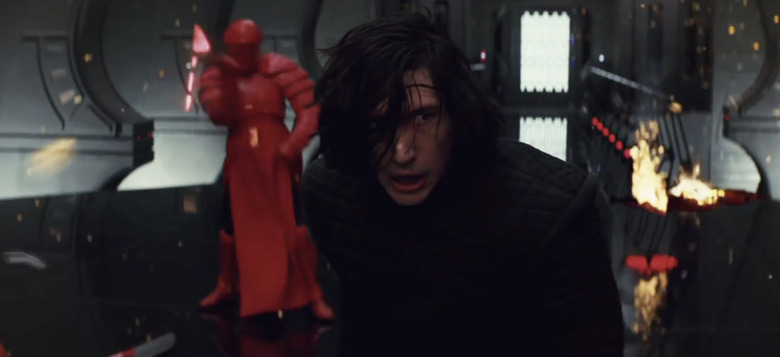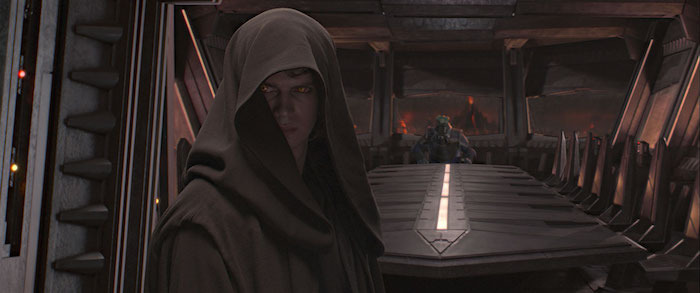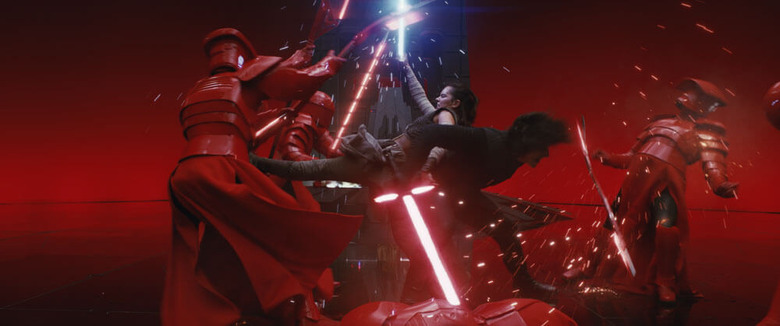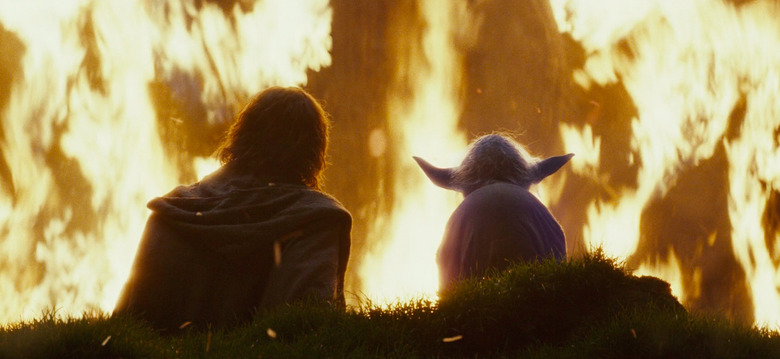A 'Star Wars' Without Skywalkers: Where Should The Galaxy Go After 'Episode 9'?
The final shot of Star Wars: The Last Jedi, a Force-sensitive stable boy gazing up at the stars, echoes Luke Skywalker watching the dual sunset on Tatooine. Separated from the original film by 40 years and an ever-widening mythology — one that's focused largely on a single lineage — the closing moments of Episode VIII brought the saga back to its roots, in a way.
As far as anyone knew in 1977, Luke was the last remaining Skywalker. Darth Vader was not his father. Leia was not his sister, and Old Ben did not live nearby specifically to protect him. Luke was a farmer and an orphan, albeit one whose father was once a Jedi. He dreamed of flying among the stars, and his journey was catalyzed not by lineage or destiny, but by the incidental murder of his aunt and uncle. He was left a nobody, thrust into a larger world of conflict that had found him by accident.
That's no longer the Star Wars we know, but when the next chapter is written in 2019, it could, and perhaps should be once again.
The Last Skywalker
Does Star Wars exist without the Skywalkers? Certainly, in the Expanded Universe of novels, video games and animated TV shows. Its vast chronology, however, is tethered to the original series of films, the point from which every Star Wars narrative appears to emanate; Star Wars' timeline will forever be measured by its proximity to its tragic Christ foil, Darth Vader, and his conflict with his son. Even seeming exceptions like Star Wars: Knights of the Old Republic, a video game set 4,000 years before the Skywalkers, builds on, and towards, the familiar.
There's no inherent issue with this approach, of course. The building of a fictional universe is predicated on it feeling connected, but the films thus far, and all of the TV shows, have focused on one long conflict, itself rooted in a single family. The rise of the Empire was Vader's doing. Its fall came at the hands of his children, Luke and Leia. His grandson, Kylo Ren now leads the First Order. All of this makes a single line in the recent Episode IX cast announcement feel especially worthy of scrutiny: "J.J. Abrams returns to direct the final installment of the Skywalker saga."
What exactly does this mean? In literal terms, it's the closing chapter of the third Star Wars trilogy, and perhaps the final film appearance of any actors and characters seen in the original series. Luke and Han are dead, and there probably isn't enough footage of the late Carrie Fisher to respectfully bring Leia to an Episode X. And there will likely be an Episode X, mind you, in a decade if not immediately. New players like Rey, Finn, Poe and (if he makes it out alive) Kylo Ren are too valuable for the Mouse House to shelve. This is the world that Disney has created with the success of the Marvel films, wherein every other studio is struggling to keep their shared universes afloat. Fittingly, Disney themselves are the only ones who have come close to replicating the Marvel formula. Solo: A Star Wars Story, while a financial exception, still leads tangentially into the original Star Wars, while billion-dollar spinoff Rogue One does so directly. Assuming Episode IX is indeed the last film to feature a Skywalker, what does this mean for the saga going forward?
The answer might seem simple on the surface, in that no film from this point on (or rather, none set after the events of Episode IX) will feature Vader, Luke, Leia or Kylo Ren. We've seen Star Wars stories like this before — and we will continue to, with James Mangold's Boba Fett movie; it's unknown what Rian Johnson's new trilogy is about — but until now, there has never been a novel or spin-off comic that didn't exist to set up, pay off or expand on some minor element or side-character in the larger Skywalker story.
The Expanded Universe novels, prior to Disney's acquisition of Lucasfilm in 2012, went all the way down Vader's family tree to his grandchildren's grandchildren, born over a century after the events of the original Star Wars; the muddled chronology even implies an unknown generation born after the children of Luke Skywalker and Mara Jade. Point being, the Skywalkers have been the Star Wars status quo for over four decades. There is an entire parallel universe of stories out there (now referred to as Legends) where one lineage remains the core of this narrative for centuries, and it was considered canonical until a few years ago. Which brings us to what might very well be a seismic shift in the saga:
If Kylo Ren dies in Episode IX, there are no more Skywalkers.
His death is conjecture on my part, of course. I do think it's likely, but I'll defer to whatever outcome is most narratively satisfying. Though even if Ren survives the next chapter (perhaps redeeming himself and giving in to Light) and the Skywalker lineage lives on, the Skywalker saga still dies with him. Or at least, it ought to. If the folks at the Lucasfilm Story Group make good on their promise of "the final installment of the Skywalker saga," there will be no more Skywalker stories left to tell once Episode IX has wrapped things up, in whatever way it chooses to. No film going forward will focus on the family that has, for centuries in the books and for multiple generations in the real world, been the center of this universe. That's going to take a while to digest — now more than ever we seem to crave the comforts of the familiar — but dramaturgically, it may also be exactly what's best for Star Wars.
The Chosen Ones
Much of Western storytelling stems from Arthurian Legend, Star Wars included. King Arthur's is a well-worn underdog tale, that of a poor outcast who pulls sword from stone to claim a royalty that's rightfully his. What's often forgotten about "the once and future king" though is that he doesn't come to prominence until book nine of Geoffrey's Historia Regum Britanniae, which covers the fictional Arthur's ancestry all the way back to historical Roman emperors. Arthur is one small part of a larger picture, but our culture continues to replicate his part of the story, and his alone.
The parallels between Luke and Arthur are clear as day (Anakin's lightsaber is even akin to the passing down of Excalibur, proving Arthur's lineage), though as if in an act of self-critique, George Lucas' own Star Wars Episode I: The Phantom Menace attempts to steer this legend in a different direction. The maligned prequel often comes under fire for the whole "midichlorian" debacle, a biological metric by which one's ability to use the Force is measured. It's never stated outright that genealogy determines one's Jedi-hood, though this tends to be the most common inference from the language used. Star Wars was, by this point in its life cycle, a story of lineage, though the origins of that lineage being called into question by the series' own creator tends to be glossed over.
The "chosen one" exists as an age-old trope of storytelling because of the societies it stemmed from, wherein blood was, in fact, considered virtue. The trope has grown stale in the modern age, wherein democracy is approaching a global norm and leaders are elected rather than born. The Matrix plays with "the chosen one" by contextualizing it as a form of oppressive manipulation; The Lego Movie does away with it entirely ("You're the Special" can apply to anyone). And while the "chosen one" does feature prominently in Lucas' prequels, its use ought to be considered one of the series' redeemable qualities.
The insistence on inducting young Anakin to the Jedi order stems from both his literal blood and the religious prophecy surrounding him. He's born of immaculate conception, descended as if from The Force itself (later implied to have been manipulated by either Palpatine or his master), though the Jedi's own doctrine as it pertains to Anakin's lineage is eventually the Order's undoing. He is "the chosen one" in every way, the only character who, by virtue of his birth, can perform the task at hand, though this very outlook is manipulated and used against those who swear by it. Lucas, who further cemented the "chosen one" in Western storytelling with Star Wars, returned to the saga to undo this narrative in a film inspired by the Hollywood Biblical epic, chariot race and all.
Some take comfort in believing Christ was born of Kings and supernaturally conceived, sent from above to cleanse us of Sin. To each their own; others find the idea of the historical Christ, a common man, more inspiring. These warring ideas are still at the heart of modern popular culture. Sam Raimi's Spider-Man series captures the character's "everyman" nature; the Amazing Spider-Man films use genetics to make him the only person who could've become Spider-Man. This debate now finds itself at the center of Star Wars, wherein vocal factions of fans decry Rey's parents being revealed to be nobodies. I do mildly side with argument that the visual language in The Force Awakens leaves the door open for a secret Jedi lineage, though when presented with the option of leaning towards or away from this, I'm glad Rian Johnson chose the latter, even if it feels, to whatever small degree, disconnected from the prior installment.
Rey's backstory in The Force Awakens reflects Luke's in a way that feels convenient, but it's where their stories diverge in The Last Jedi that makes all the difference. The point has been discussed ad infinitum by now, especially through the meta-textual lens of gatekeeping: Kylo Ren is born of Star Wars royalty while Rey is "a nobody," though should that make her any less worthy of The Force? More pertinently, through the establishment of both Rey and the stable boy (and arguably, Donnie Yen's Chirrut Îmwein in Rogue One), the Force is decidedly no longer a product of birth, and inducting children into a cult they don't understand is reserved for the First Order.
The anonymous stable boy echoes Anakin as much as he does Luke (down to his "Woo-hoo!"). He was either born or sold into slavery, though his anonymity is precisely why he feels like a necessary reflection of a young Darth Vader. There is no blood prophecy surrounding him. He is not a Christ figure. He likely comes from no Jedi royalty, and he was merely incidental to the larger narrative (Rose and Finn found him en route to their ship, whereas Qui Gon claims the Force led him to Anakin) and we may never even the boy on screen again. The only way he descends from the Jedi is through the stories of Luke Skywalker that he and the other stable kids re-enact; his only contact with the Light side of the Force is the kindness of ordinary Rebels. If the Skywalker lineage ends with Ren, the Skywalker spirit lives on.
Star Wars, the American Myth
Star Wars blurs the line between sci-fi and fantasy, not only through its mixture of aliens and magic, but through its narrative perspective. Like great sci-fi, it speculates on what's to come in the modern world; weapons that could wipe out entire cultures would be an overreach of power, just as space travel and fully functional prosthetic limbs would make for a wonderful future. But modern Western/Anglo-Saxon fantasy (often drawn from Tolkein, himself inspired by Arthurian myth) gazes back at the way things were. Dynasties. Blood-feuds. Stories of lineage. These are dramatically potent, no doubt — Aragorn, the rightful King of Gondor, fears a weakness inherited over millennia — but Star Wars has a distinction borne by neither The Lord of the Rings nor Game of Thrones, nor even most modern sci-fi for that matter:
Star Wars isn't just a product of American capitalism. It's Americana.
The Saga is an American artifact. A confluence of cultures, cinematic styles and spiritual perspectives that stem from America's melting-pot experiment. To what degree George Lucas watered down or (mis)appropriated these cultural facets is a valid conversation, though as a continuum, Star Wars seeks to improve. Paradoxically, part of this improvement is a function of capitalism too; regardless of whether newer audiences see women, people of colour and LGBTQ folks as financially viable, it isn't until studios have hard numbers to back this up that more films will reflect reality. But this is, in fact, the new Star Wars regardless. Whether one chooses to see it as lip-service, pandering, or genuine artistic vision, our new heroes are women and people of colour (the lack of queerness bolsters the point of capitalist acceptance), and some of the Eastern perspectives Lucas originally paid lip-service to even find themselves paid off in The Last Jedi; Luke's arc, for instance, is visually and thematically entwined with Buddhist nirvana, among other Eastern philosophies.
The original Star Wars was born partially out of Lucas' anti-war perspective; it's the Vietnam movie he wasn't able to make (he was once attached to direct Apocalypse Now). The central debate engulfing America at this time however, is one of birthright. It is by birth that Americanness is decided, and thus, human worth; naturalized citizens run the risk of being denaturalized, while those who come to America seeking refuge from violence are locked in detention camps. America continues to be hostile to those not born into whiteness, the structure it was built on in the first place through slavery and Manifest Destiny.
It would be pithy to suggest franchise cinema could have a major role in fixing these structural problems, but Star Wars is, and always has been, a reflection of America. The prequel films, for all their faults, were set against a democracy descending into authoritarianism through fear and propaganda — "Execute Order 66" sounds far too much like "Executive Order 9066" to be coincidence — prophesying the inevitable outcome of the War on Terror. The idea that Jedi-hood ought to remain solely inherited, or that the narrative focus ought to remain on those it was passed down to from a quasi-religious figure, is antithetical not only to where Star Wars ought to go (an admittedly subjective conclusion), but more pertinently, where Star Wars is already headed.
What Comes Next?
The Last Jedi tells not only of the failure of the Jedi Order, an old-world paradigm that let the forces of fascism fester in the shadows, but of the form that same failure takes today. Luke Skywalker sees his father in the young Ben Solo (though what he arguably senses, like in the cave in The Empire Strikes Back, is the worst version of himself) but the film ultimately comes down on the side of lineage being irrelevant in determining what one deserves. Luke Skywalker repeated the mistakes of the Jedi, just as America continues to repeat the mistakes of past authoritarianism, elsewhere and at home. Yet the future of the Rebellion lies not with the son of legendary war heroes and literal royalty, but with the outsiders. Not only Force-users like Rey and the stable boy, but ordinary members of the workforce like Rose and Finn.
I love the Skywalker saga. I will always love the Skywalker saga. Depending on the day, Return of the Jedi is my favourite of the original films precisely because it's a story of lineage. In it, Luke grapples with the worst parts of himself, parts that are a reflection of where he comes from. And therein lies the central problem of the Skywalker saga as an overarching framework for heroism. Its heart and soul lies not in virtue passed down, but in cycles of anger and hatred. The original trilogy culminates in Luke's refusal to follow the violent path of his father. The next time he nearly gives in to it, he creates Kylo Ren, who picks up where the cycle left off. If the Skywalker saga is about the breaking and re-forging of this cycle of male angst, then maybe it's worth telling as history continues to repeat itself in the real world. But it also denotes the need for a wider berth of perspectives writing both cinema and history, and maybe it's time we tell the story of how this cycle ends.
If the casting announcement was mere marketing spin and if there are more Skywalker stories to be told, so be it. If every spin-off film from this point on builds to or stems from the Skywalker conflict, it would certainly make sense financially. However, if Star Wars as a whole is to move forward, it has to grow beyond the Skywalkers.
And we have to let it.




